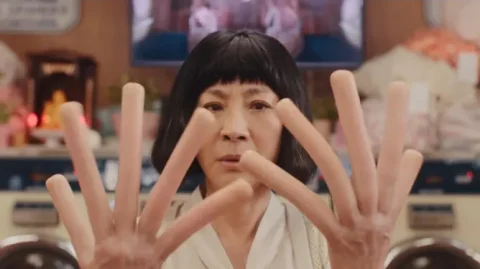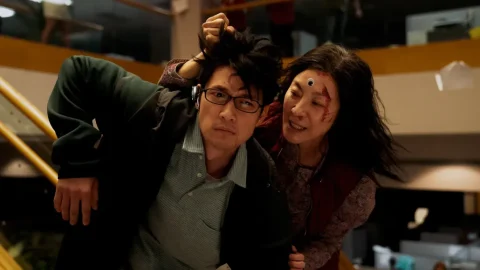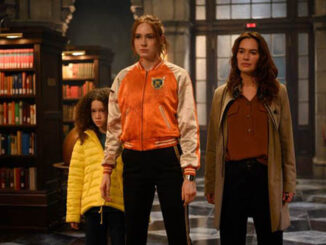Everything Everywhere All at Once (2022)
Directed by: Dan Kwan, Daniel Scheinert
Written by: Dan Kwan, Daniel Scheinert
Starring: Jamie Lee Curtis, Ke Huy Quan, Michelle Yeoh, Stephanie Hsu
USA
RUNNING TIME: 140 mins
REVIEWED BY: Dr Lenera

Chinese-American Evelyn Quan Wang runs a laundromat with her husband, Waymond. Tensions are high due to the laundromat being audited by the IRS, Waymond is trying to give Evelyn divorce papers, Evelyn’s demanding father Gong Gong has just arrived from China; and her daughter Joy turns up with her girlfriend Becky. While at the IRS building, Waymond’s personality changes when his body is briefly taken over by Alpha Waymond, a version of Waymond from the “Alphaverse”. It seems that many parallel universes exist, since every choice made creates a new universe. The people of the Alphaverse, led by the late Alpha Evelyn, developed “verse-jumping” technology that allows people to access the skills, memories, and body of their parallel universe counterparts by fulfilling specific conditions. And now the multiverse is being threatened by Jobu Tupaki, formerly Alpha Joy, who’s created an “everything bagel” that can potentially destroy everything….

“Be kind, especially when you don’t know what’s going on.” I guess that line said by Waymond to Evelyn sums up one of the major themes of this movie and it’s certainly a good message. Indeed there are a couple of other lines which have stuck with him because they seem a bit meagingful. But then Waymond also says to Evelyn, “But you, here, you’re capable of anything because you’re so bad at everything” which doesn’t make any sense at all and probably epitomises this bonkers motion picture. Everything Everywhere All At Once comes with a hell of a lot of glowing reviews, and I wanted to see it two weeks ago but it’s had a bizarre release in the UK for a film that did surprisingly well in the States in a sad time when it seems that big familiar franchises rule and originality obviously doesn’t appeal as much as it used to. My local cinema was supposed to be showing it two weeks ago, but then it was postponed by two weeks even though it was still being shown at other cinemas ran by the same chain. As I type, I’m somewhat puzzled by both the movie and those glowing reviews – okay I haven’t read any of the latter but I do know that they glow with praise. Initially planned to star Jackie Chan in the role now played by Michelle Yeoh, it’s an absurdist, virtually surreal piece carrying some deep themes. Two rocks talking to each other in subtitles and a universe where people have hot dogs for hands share space with very relatable and important life lessons. These two opposite elements don’t always mesh together well and the first third or so is so frantic, with exposition being delivered at top speed, that it’s hard to work out what’s actually going on in places, while the same imagery keeps being repeated over and over again. Yet as things develop they become rather emotional and genuinely thought provoking in ways that I can’t see any of these Marvel multiverse pics ever being. And the cast, headed by an absolutely fantastic Yeoh, all deliver.
So Evelyn’s life isn’t in a very good place, at least from her point of view, what with the family business struggling that’s leading to financial woes, dad coming over, daughter being a lesbian, and hubby wanting a divorce – Evelyn being so busy with other things that she failed to notice the lack of communication in her marriage. Waymond is a bit of a wimp and also negative about most things, and one wonders how somebody like Evelyn ever got together with him, though I guess we’re invited to think that he may not always have been like this. There doesn’t seem to be much of a connection with Gong Gong her father, a very traditional and strict type, nor does there seem to be one with daughter Joy. Very much of the old school, Evelyn finds it very hard to accept Joy’s sexuality, and god forbid Gong Gong knows about this. The familiar theme, especially in Asian cinema, of tradition versus modernity is handled with a light yet well-observed touch. And then husband and wife go to the IRS. The person they see, Deirdre Beaubeirdre, is an intimidating sort and obviously takes delight in seeing that businesses are closed down, Jamie Lee Curtis clearly having loads of fun in this part. Then suddenly Waymond starts acting weirdly, telling her a whole load of seemingly crazy shit including telling her to imagine she’s in a closet, to shut her eyes and to remember to breath. Okay, the last instruction isn’t crazy at all, but you get the picture. It seems to me that a major problem here is that Waymond – or rather Alpha Raymond – has to enlighten Evelyn and us with so much information that it’s very rushed and we don’t pick up on all of it. I don’t know how this could have been avoided, seeing as the film is already pretty long [though it never drags], but confusion does reign supreme for a while. Maybe screenwriters Dan Kwan and Daniel Scheinert, who also directed, shouldn’t have bothered with half of this stuff instead!
But then this first section of a film comprising of three parts whose titles together make up its title does seem to set out to irritate at times. The concept of every decision forming its own multiverse is nice, but, as Evelyn starts to access not just her past but her own alternate dimensions where her life[s] could have been very different, for a while we tend to get a lot of brief flashes of scenes which prevent full immersion. And at first the hopping from one dimension to another isn’t always clear, though this may have been intentional seeing as amusing shocks like Evelyn punching Deirdre hit harder. This moment causes three different emotional responses; first of all we’re stunned, then we laugh, then feel for the clearly hurt Dierdre as surely her manner and actions didn’t actually deserve such violence, introducing a theme which will come to amazing fruition in an amazing scene much, much later. Some security guys show up, but Alpha Waymond knows martial arts. Despite the jerky cinematography of the scene which is bizarre seeing as none of the successive action looks like this, one can still get a kick [sorry] out of seeing Short Round himself do this stuff, though what’s strange is that Ke Huy Quan’s voice sounds almost the same as it did as a kid in the ’80s. Still, on the evidence here he’s become a fine actor, so let’s hope that it leads to a more successful career in front of the camera then when he previously tried. Of course Yeoh herself gets to fight, and the most dwelt on of the multiverses has her character being a martial artist and then a movie star in China instead of moving to America, a joy to those of us old Hong Kong movies lovers when, before Tomorrow Never Dies and Crouching Tiger, Hidden Dragon, Yeoh was virtually the queen of action cinema for a while, even managing to give Jackie Chan a run for his money in Police Story 3.

However, any heroine would find it difficult when the demon that’s out to destroy all multiverses takes the form of her daughter. Nonetheless Alpha Waymond comes to believe that Evelyn, as the greatest failure of all Evelyns of the multiverse, has the untapped potential to defeat Jobu Tupaki, even though she also has an Alpha Gong Gong to deal with. Of course Jobu Tupaki, this extremely powerful force that could destroy every single thing, symbolises Evelyn’s fears concerning Joy. Alpha Joy’s mind was splintered after Alpha Evelyn pushed her to extensively verse-jump; Jobu now experiences all universes at once and can verse-jump and manipulate matter at will, so much that he’s created this black hole-like bagel. The madness certainly continues; I haven’t yet mentioned the universes where Evelyn is in a romantic relationship with Dierdre and works alongside a teppanyaki chef who’s secretly puppeteered by a racoon, obviously inspired by a mention of Ratatouille earlier on. Not everything seems to be inspired by Evelyn’s regrets, worries and musings on different pathways that her life might have gone down; insanity for insanity’s sake is still often present. But poignancy increasingly takes over, which is especially good when the action gets rather repetitious, constantly returning to the same situations. The real reason why this bagel’s been created will strike a chord with many parents who don’t feel that they understand their children, and Evelyn’s final “fight” – if it can be called that – is a transcendental sequence of beauty and simple, unabashed feeling that’s a joy to experience. Here, Everything Everywhere All At Once hits an incredible height that far too many films now never even attempt, and one can almost forgive much of the earlier clumsiness.
One certainly comes away with a lot of food for thought, and that’s something that should be celebrated these days. The themes are quite simple, really, but profoundness needn’t be complex. Maybe those who fight us do so out of pain that could be hidden. It doesn’t really do us good to think too much about what could have been, but these thoughts, if managed properly, can aid us in dealing with the reality of our lives now. It’s tempting to see life as essentially meaningless, but surely it’s better to try to approach it from the other side and relish the freedom in being able to do what we want with the time that we have left. Love with a caring other half can be the best thing with a troubled background- perhaps this idea isn’t too fashionable in today’s often strange times? Let’s do our best to accept our kids for who they are and not try to mould them – one notable aspect here is that Gong Gong was the same to his daughter as she now is to her daughter, though this almost feels like a subplot that’s been cut down somewhat, something which is a darn shame considering what a strong presence James Hong still is at age 93. Do some of his moments deliberately recall Big Trouble In Little China or was that just me thinking up associations that aren’t actually there? But then we have Yeoh’s amazing performance. While I’ve been a fan since the days of Yes Madam, I haven’t quite seen every single one of her films, but I reckon that this could be her defining screen turn, or at least the greatest showcase for her talents. She still has the action moves, but also has a terrific touch for comedy which is quite subtle and nicely balances out the craziness that surrounds her character, not to mention a brilliance for serious drama, able to convey deep emotion often with just a look. She barely seems to age either. With these luminaries, Stephanie Tsu and Tallie Medel do incredibly well in holding their own as they head the youthful side.
Some of the CGI doesn’t look too great, but then compared to your typical Hollywood blockbuster the budget for this was comparatively low, so we can forgive this, even if I’m tempted to go on yet again about how practical special effects ought to be employed more if digital stuff are likely to come out dodgy. Yet there’s certainly something of the unbridled “anything goes” feel to the whole piece that Hong Kong cinema had in its glory days. Despite my issues with a few aspects, I’ve decided, in the course of writing this review, that I should be pleased about the response of the critics to this, when so many of them today seem to sadly support the same old same old, more than anything else. Times are hard, but the fact that Kwan and Scheiner were able to make their eccentric vision, get it into cinemas and get it seen by a decent number of people is cause for celebration, even I personally could have done with slightly less madness and slightly more clarity, a bit more tying of its extremes together. But then it’s an insane world. And I do wonder what would have happened if….








Be the first to comment